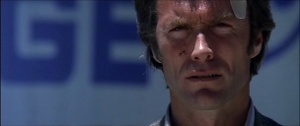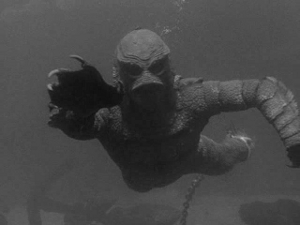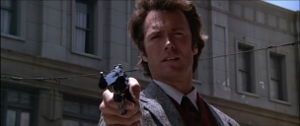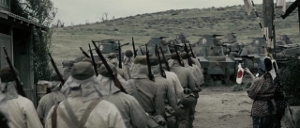
Blanket Spoiler Warning for a forty year old film you should’ve already seen. But, then again, who am I to talk? I’ve seen pieces of Magnum Force over the decades, and everyone’s seen the clip of Harry saying, “Man’s got to know his limitations” for the third and final time, buttoning up Our Theme. That clip’s the next-to-last shot of the film so, in one sense, a thousand Eastwood Retrospectives have already spoiled it in more ways than I ever could, just talking about it.
So let’s talk about Magnum Force, the One With Those Other Vigilante Cops Who Don’t Play By the Rules. The film that exists explicitly because everyone called Dirty Harry fascist. It’s star, a self-described “political nothing” who now admits registering with the official Political Nothing Party (the Libertarians) took all the “fascism” talk personally. Especially since an early draft of Dirty Harry‘s script centered around, not a psycho killer vaguely based on Zodiac, but a gang of vigilante cops much easier to confuse for fascists than Hangdog-faced Harry.
Eastwood liked that script, but Don Siegel preferred the one with Scorpio. And America agreed, making Dirty Harry the fourth highest grossing film of 1971, right behind Diamonds Are Forever. With Dirty Harry only eight million dollars less popular than James Bond, a sequel was inevitable. Or so we’d say on this side of the 1970s, a decade that, among other things, saw sequels gain a measure of acceptance in polite company. They’d always existed, of course, but Hollywood A-listers and cultural pundits shunned them as fundamentally low, pulpy things. Besides, Big Name Stars put butts in movie theaters, not on-going stories. The very idea was regarded as silly, the kind of notion that drove “silly,” “juvenile” stuff like superhero comic books. Movies, the thinking went, could certainly be better than that…couldn’t they? Continue reading Magnum Force (1973)



 World War II films and I have an understanding: I don’t watch them and they can go on propping up whatever brand of historical whitewashing is popular at moment. Rare is the film that consciously sets out to subvert the usual tropes of their perpetually John Wayne genre, or the deification of Tom Brokaw’s “Greatest” Generation. Whenever such a film emerges from the vacuous, exploitative, corporatist, Hollywood hive it is duly acknowledged by critics, nodded at by the Academy Awards…and promptly forgotten about. Case in point:
World War II films and I have an understanding: I don’t watch them and they can go on propping up whatever brand of historical whitewashing is popular at moment. Rare is the film that consciously sets out to subvert the usual tropes of their perpetually John Wayne genre, or the deification of Tom Brokaw’s “Greatest” Generation. Whenever such a film emerges from the vacuous, exploitative, corporatist, Hollywood hive it is duly acknowledged by critics, nodded at by the Academy Awards…and promptly forgotten about. Case in point: